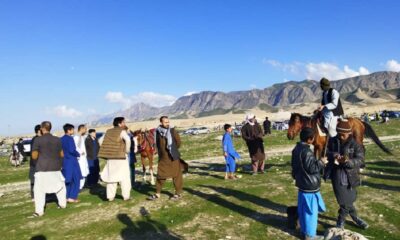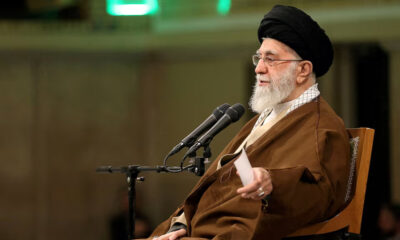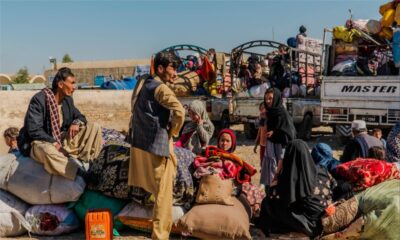World
Dam destroyed in Ukraine, flooding war zone
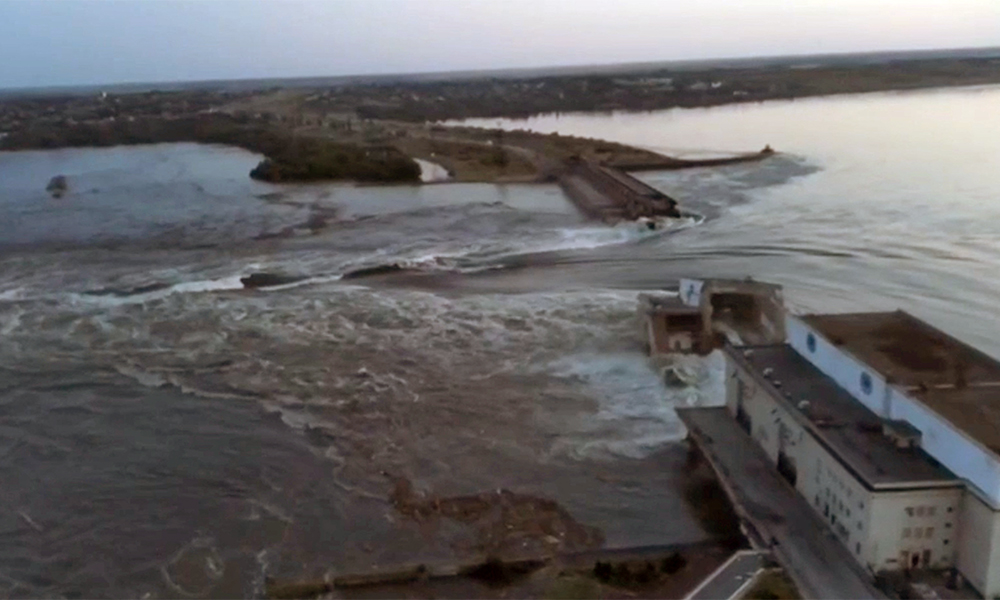
A torrent of water burst through a huge dam on the Dnipro River that separates Russian and Ukrainian forces in southern Ukraine on Tuesday, flooding a swathe of the war zone and forcing villagers to flee.
Ukraine and its Western allies accused Russia of blowing up the dam in a deliberate war crime. The Kremlin said it was Ukraine that had sabotaged the dam, to distract attention from a counteroffensive Moscow claims is faltering. Some Russian-installed officials said the dam had burst on its own, Reuters reported.
Neither side offered immediate public evidence of who was to blame. The Geneva Conventions explicitly ban targeting dams in war, because of the danger to civilians posed by destruction of such “works and installations containing dangerous forces”.
By mid-morning in the city of Kherson on the Ukrainian-held side, a pier on a tributary of the Dnipro had already been submerged by the surge climbing the banks.
“The water level has so far risen one meter,” resident Oleksandr Syomyk told Reuters. “We’ll see what happens next but we hope for the best.”
The Nova Kakhovka dam supplies water to a swathe of southern Ukraine’s agricultural land, including the Russian-occupied Crimean peninsula, as well as cooling the Russian-held Zaporizhzhia nuclear plant. The vast reservoir behind it is one of the main geographic features of southern Ukraine, 240 km long and up to 23 km wide.
A swathe of countryside lies in the flood plain below, with villages on the Russian-held southern bank seen as particularly vulnerable.
The destruction of the dam creates a new humanitarian disaster in the center of the war zone and transforms the front lines just as Ukraine is unleashing a long-awaited counteroffensive to drive Russian troops from its territory.
Russia has controlled the dam since early in the war, although Ukrainian forces recaptured the northern side of the river last year. Both sides had long accused the other of planning to destroy it.
“Russian terrorists. The destruction of the Kakhovka hydroelectric power plant dam only confirms for the whole world that they must be expelled from every corner of Ukrainian land,” President Volodymyr Zelenskiy wrote on the Telegram messaging app.
Russians had “carried out an internal detonation of the structures” of the dam. “About 80 settlements are in the zone of flooding,” he said on Telegram.
NATO’s Secretary-General Jens Stoltenberg called it “an outrageous act, which demonstrates once again the brutality of Russia’s war in Ukraine”.
Kremlin spokesman Dmitry Peskov told a regular news briefing: “We can state unequivocally that we are talking about deliberate sabotage by the Ukrainian side.”
The U.N. nuclear watchdog said the Zaporizhzhia power plant should have enough water to cool its reactors for “some months” from a separate pond located above the reservoir, and called for the pond to be spared.
The water level at the town immediately adjacent to the breached dam could rise by up to 12 meters, its Russia-installed mayor, Vladimir Leontyev, said on Telegram.
Video showed water surging through the remains of the dam – which is 30 meters tall and 3.2 km long.
Some 22,000 people living across 14 settlements in Kherson region are at risk of flooding, Russia’s RIA news agency quoted the Moscow-installed head of the region as saying. Kherson is one of five Ukrainian regions Moscow claims to have annexed.
World
Anti-Trump protesters gather in Washington, other US cities
Some 150 activist groups had signed up to participate, according to the event’s website. Protests were planned in all 50 states plus Canada and Mexico.

Thousands of protesters gathered in Washington, D.C., and across the U.S. on Saturday, part of some 1,200 demonstrations that were expected to form the largest single day of protest against President Donald Trump and his billionaire ally Elon Musk since they launched a rapid-fire effort to overhaul government and expand presidential authority.
People streamed onto the expanse of grass surrounding the Washington Monument under gloomy skies and light rain. Organizers told Reuters that more than 20,000 people were expected to attend a rally at the National Mall.
Some 150 activist groups had signed up to participate, according to the event’s website. Protests were planned in all 50 states plus Canada and Mexico.
Terry Klein, a retired biomedical scientist from Princeton, New Jersey, was among those who gathered by the stage beneath the Washington Monument.
She said she drove down to attend the rally to protest Trump’s policies on “everything from immigration to the DOGE stuff to the tariffs this week, to education. I mean, our whole country is under attack, all of our institutions, all the things that make America what it is.”
The crowd around the memorial continued to build throughout the day. Some carried Ukrainian flags and others wore Palestinian keffiyeh scarves and carried “Free Palestine” signs, while Democrats from the U.S. House of Representatives blasted Trump’s policies on stage.
Wayne Hoffman, 73, a retired money manager from West Cape May, New Jersey, said he was concerned about Trump’s economic policies, including his widespread use of tariffs.
“It’s going to cost the farmers in the red states. It’s going to cost people their jobs – certainly their 401Ks. People have lost tens of thousands of dollars,” Hoffman said.
Kyle, a 20-year-old intern from Ohio, was a lone Trump supporter, sporting a “Make America Great Again” hat and walking the fringe of the Washington, D.C., rally while engaging protesters in debate.
“Most people aren’t too hostile. A few people cuss,” said Kyle, who declined to give his last name.
Trump, who shook financial markets and upset nations around the world with a raft of trade tariffs this week, spent the day in Florida, playing a round of golf at his club in Jupiter before returning to his Mar-a-Lago compound in the afternoon.
Some four miles (6 km) from Mar-a-Lago in West Palm Beach, more than 400 demonstrators gathered on a sunny day in protest. Drivers honked their horns in support of the pastel-and khaki-clad demonstrators as they passed by.
“Markets tank, Trump golfs,” read one sign.
At another protest in Stamford, Connecticut, Sue-ann Friedman, 84, brought a bright pink, handmade sign objecting to the administration’s moves to cut funding for medical research.
“I thought my marching days were over, and then we get somebody like Musk and Trump,” said Friedman.
Paul Kretschmann, a 74-year-old retired attorney in Stamford, said it was the first time he had ever attended a protest.
“My concern is that Social Security is going to be gutted, that we’re going to lose our benefits, and that there’s going to be nobody around to administer it in the first place,” he said. “I’m afraid that this is all part of a larger plan to dismantle the government and for Trump to maintain power.”
With Trump’s blessing, Musk’s Department of Government Efficiency team has scythed through the U.S. government, eliminating more than 200,000 jobs from the 2.3 million federal workforce. At times, the effort has been haphazard and forced the recall of needed specialists.
On Friday, the Internal Revenue Service began laying off more than 20,000 workers, as much as 25% of its ranks.
Several hundred people gathered outside the headquarters of the Social Security Administration, a top DOGE target, near Baltimore to protest against cuts to the agency which delivers benefits to the elderly and disabled.
Linda Falcao, who turns 65 in two months, told the crowd she had been paying into the Social Security fund since the age of 16.
“I’m terrified, I’m angry, I’m pissed, I’m bewildered this could happen to the United States,” she said. “I do love America and I’m heartbroken. I need my money. I want my money. I want my benefits!” The crowd chanted, “It’s our money!”
White House assistant press secretary Liz Huston disputed the protesters’ charge that Trump aimed to cut Social Security and Medicaid.
“President Trump’s position is clear: he will always protect Social Security, Medicare, and Medicaid for eligible beneficiaries. Meanwhile, the Democrats’ stance is giving Social Security, Medicaid, and Medicare benefits to illegal aliens, which will bankrupt these programs and crush American seniors,” Huston said in an email.
Much of Trump’s agenda has been restrained by lawsuits contending he has overstepped his authority with attempts to fire civil servants, deport immigrants and reverse transgender rights.
Trump returned to office on January 20 with a stream of executive orders and other measures critics say are aligned with an agenda outlined by Project 2025, a deeply conservative political initiative to reshape government and consolidate presidential authority. His supporters have applauded Trump’s audacity as necessary to disrupt entrenched liberal interests.
Hours before the protests were due to kick off in the United States, hundreds of anti-Trump Americans living in Europe gathered in Berlin, Frankfurt, Paris and London to voice opposition to Trump’s sweeping makeover of U.S. foreign and domestic policies.
World
As Iran tensions build, US military moves warplanes to reinforce Middle East
U.S. President Donald Trump threatened Iran on Sunday with bombing and secondary tariffs if Tehran did not come to an agreement with Washington over its nuclear program.

U.S. Defense Secretary Pete Hegseth has reinforced U.S. military capability in the Middle East with more warplanes, the Pentagon said on Tuesday, amid a more than two-week-old U.S. bombing campaign in Yemen and mounting tensions with Iran, Reuters reported.
The Pentagon’s brief statement did not specify which aircraft were being deployed or where precisely they were sent.
However, as many as six B-2 bombers have relocated in the past week or so to a U.S.-British military base on the Indian Ocean island of Diego Garcia, according to U.S. officials, speaking on condition of anonymity.
Experts say that puts the B-2s, which have stealth technology and are equipped to carry the heaviest U.S. bombs and nuclear weapons, in an ideal position to operate in the Middle East.
“Should Iran or its proxies threaten American personnel and interests in the region, the United States will take decisive action to defend our people,” Pentagon spokesperson Sean Parnell said in a statement.
The U.S. military’s Strategic Command has declined to say how many B-2s have reached Diego Garcia and noted that it does not comment on exercises or operations involving the B-2.
There is already considerable firepower in the Middle East and the U.S. military will soon have two aircraft carriers in the region, read the report.
U.S. President Donald Trump threatened Iran on Sunday with bombing and secondary tariffs if Tehran did not come to an agreement with Washington over its nuclear program.
While B-2 bombers have been employed to strike buried Houthi targets in Yemen, most experts say use of the stealthy bomber is overkill there and the targets aren’t buried so deeply.
However, the B-2 is equipped to carry America’s most potent bomb — the 30,000-pound GBU-57 Massive Ordnance Penetrator. That is the weapon that experts say could be used to strike Iran’s nuclear program.
There are only 20 B-2 bombers in the Air Force’s inventory so they are usually used sparingly.
Iran’s Supreme Leader Ayatollah Ali Khamenei said on Monday the U.S. would receive a strong blow if Trump followed through with his threats.
Revolutionary Guards Aerospace Commander Amirali Hajizadeh threatened U.S. forces in the Middle East, noting American bases in the Middle East and adding: “They are in a glass house and should not throw stones.”
One official told Reuters that the U.S. military was also moving some air defense capabilities from Asia to the Middle East.
In his 2017-2021 term, Trump withdrew the U.S. from a 2015 deal between Iran and world powers that placed strict limits on Tehran’s disputed nuclear activities in exchange for sanctions relief. Trump also reimposed sweeping U.S. sanctions.
Since then, Iran has far surpassed that deal’s limits on uranium enrichment.
Western powers accuse Iran of having a clandestine agenda to develop nuclear weapons capability by enriching uranium to a high level of fissile purity, above what they say is justifiable for a civilian atomic energy program. Tehran says its nuclear program is wholly for civilian energy purposes.
World
Israel kills Hezbollah official in deadly Beirut airstrike

An Israeli airstrike killed four people including a Hezbollah official in Beirut’s southern suburbs on Tuesday, a Lebanese security source said, further testing a shaky ceasefire between Israel and Iran-backed Hezbollah.
The Israeli military said the official – Hassan Bdeir – was a member of a Hezbollah unit and Iran’s Quds Force, and he had assisted the Palestinian group Hamas in planning a “significant and imminent terror attack against Israeli civilians,” Reuters reported.
The Lebanese security source said the target was a Hezbollah figure whose responsibilities included the Palestinian file. The Lebanese health ministry said the strike killed four people – including a woman – and wounded seven others.
It marked Israel’s second airstrike in the Hezbollah-controlled suburb of Beirut in five days, adding to strains on the U.S.-brokered ceasefire that ended last year’s devastating conflict.
The attacks on Beirut’s southern suburbs have resumed at a time of broader escalation in the region, with Israel having restarted Gaza strikes after a two-month truce and the United States hitting the Iran-aligned Houthis of Yemen in a bid to get them to stop attacking Red Sea shipping.
Hezbollah lawmaker Ibrahim Moussawi said the Israeli attack amounted to “a major and severe aggression that has escalated the situation to an entirely different level”.
Speaking in a televised statement after visiting the building that was struck, he called on the Lebanese state to “activate the highest level of diplomacy to find solutions”.
Israeli Foreign Minister Gideon Saar said the eliminated Hezbollah operative posed “a real and immediate threat”. “We expect Lebanon to take action to uproot terrorist organizations acting within its borders against Israel,” he said.
Israel dealt severe blows to Hezbollah in the war, killing thousands of its fighters, destroying much of it arsenal and eliminating its top leadership including Hassan Nasrallah.
Hezbollah has denied any role in recent rocket attacks from Lebanon towards Israel, including one that prompted Israel to carry out an airstrike on the southern suburbs last Friday.
Tuesday’s strike in the early hours appeared to have damaged the upper three floors of a building, a Reuters reporter at the scene said, with the balconies of those floors blown out.
The glass on the floors below was intact, indicating a targeted strike. Ambulances were at the scene as families fled to other parts of Beirut.
There was no advance warning, in contrast to the attack on Friday when the Israeli military announced which building it intended to hit and ordered residents to leave the area.
Lebanese President Joseph Aoun condemned the latest airstrike, calling it a “dangerous warning” that signals premeditated intentions against Lebanon, which would intensify diplomatic outreach and mobilise international allies.
Lebanese Prime Minister Nawaf Salam said the strike was a flagrant breach of a U.N. Security Council Resolution upon which the ceasefire was based, and the ceasefire arrangement.
U.S. BACKS ISRAEL
The ceasefire agreement demanded that southern Lebanon be free of Hezbollah fighters and weapons, that Lebanese troops deploy into the area, and that Israeli troops withdraw.
But each side accuses the other of failing to implement the terms fully. Israel says Hezbollah still has infrastructure in the south, while Lebanon and Hezbollah say Israel is occupying Lebanese soil by not withdrawing from five hilltop positions.
The U.S. State Department said that Israel was defending itself from rocket attacks that came from Lebanon and that Washington blamed “terrorists” for the resumption of hostilities.
“Hostilities have resumed because terrorists launched rockets into Israel from Lebanon,” a State Department spokesperson said in an email, responding to a question from Reuters seeking reaction to Tuesday’s airstrike. Washington supported Israel’s response, the spokesperson said.
The Israel-Hezbollah conflict was ignited when Hezbollah opened fire in support of Hamas at the start of the Gaza war. It escalated in September when Israel went on the offensive, declaring the aim of securing the return home of tens of thousands of people evacuated from homes in the north.
The war uprooted more than a million people and killed at least 3,768 people in Lebanon, according to a Lebanese health ministry toll from November. Dozens more have been reported killed by Israeli fire since the ceasefire.
Lebanon’s figures do not distinguish between civilians and fighters.
During the war, Hezbollah strikes killed 45 civilians in northern Israel and the Israeli-occupied Golan Heights. At least 73 Israeli soldiers were killed in northern Israel, the Golan Heights, and in combat in southern Lebanon, according to Israeli authorities.
-

 Latest News5 days ago
Latest News5 days agoMinistry of Economy calls on US to release Afghanistan’s frozen funds
-

 Latest News5 days ago
Latest News5 days agoPakistan ‘extends’ deadline for a week for Afghans to leave the country
-

 World5 days ago
World5 days agoAs Iran tensions build, US military moves warplanes to reinforce Middle East
-

 Sport5 days ago
Sport5 days agoIPL 2025: Batters in race for prestigious Orange Cap
-
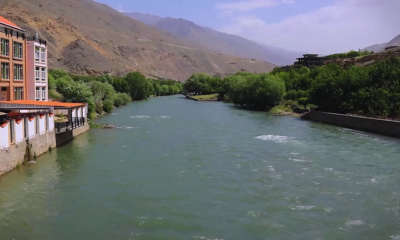
 Latest News4 days ago
Latest News4 days agoPanjshir to Kabul water conduit project ‘waiting for budget approval’
-
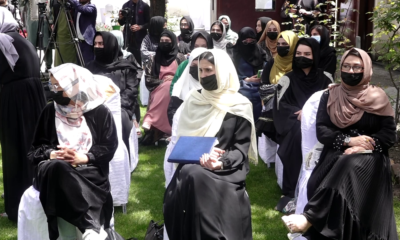
 Latest News5 days ago
Latest News5 days agoFemale journalists complain about lack of access to accurate and timely information
-

 Business4 days ago
Business4 days agoExports to Pakistan grind to a halt over faulty scanner at Torkham
-

 Regional4 days ago
Regional4 days agoMilitary confrontation seems inevitable if no new Iran nuclear deal, France says




